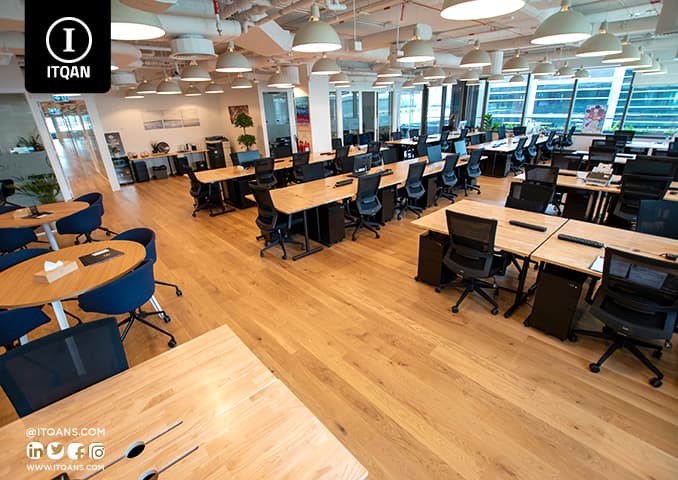Dubai is one of the world’s leading destinations for establishing businesses, particularly in the free zones that offer extensive facilities to attract investors from around the world. Dubai’s free zones, such as Jebel Ali, Dubai South, and Dubai Airport, offer a flexible investment environment that supports growth and innovation, making them an ideal choice for entrepreneurs seeking sustainable success. Free zones offer investors unique advantages, including 100% foreign ownership, tax exemptions, and simplified and rapid incorporation procedures, enhancing Dubai’s appeal as a business hub in the region. In this article, we’ll explore five advantages of establishing a company in a Dubai free zone.
Establishing a company in Dubai’s free zones allows business owners to choose the strategic location that best suits their business. Each free zone offers specialized services that support a variety of sectors, such as trade, industry, logistics, technology, and media. Thanks to this diversity, new businesses can benefit from advanced infrastructure, world-class transportation and shipping facilities, and easy access to international markets.
Establishing a company in a Dubai free zone requires a few basic steps, including choosing the type of activity, determining a trade name, preparing the necessary documents, and obtaining the necessary licenses. While the steps may seem complex to some new investors, seeking specialized consulting services can simplify the process and ensure compliance with local laws and regulations.
Simply put, establishing a company in a Dubai free zone is not just a business move; it’s an investment in a promising future within a dynamic and innovative city. With all these capabilities and facilities, Dubai offers a unique opportunity for business owners to achieve their goals on a stable and prosperous footing.

Table of Contents
ToggleEstablishing a Company in a Dubai Free Zone
Establishing a company in a Dubai free zone typically involves specific procedures and requirements. Here are the general steps for establishing a company in a Dubai free zone:
Choosing a Free Zone: Select the free zone in which you wish to establish your company. There are several free zones in Dubai, such as Jebel Ali Free Zone, Dubai Investments Free Zone, and Dubai Technology Free Zone.
Choosing a Company Type: Select the type of company you wish to establish, such as a joint stock company or a limited liability company.
Choosing a License: Select the type of license you require that best suits your company’s activity, such as manufacturing, trading, or services.
Choosing a Trade Name: Choose a trade name for your company and ensure it complies with the rules and regulations of the free zone.
Submitting Documents: Submit all required documents to establish the company, such as a copy of your passport, proof of address, and other documents.
Paying Fees: Pay the required fees to establish the company and obtain the license.
Incorporating the Company: After completing all procedures and requirements, the company will be officially incorporated and the license will be issued.
Open a Bank Account: Open a bank account in the company’s name to manage financial transactions.
Contract Signing: You may need to sign contracts with the local authorities in the free zone before starting business.
Tax and Legal Compliance: Ensure compliance with all local tax and legal laws and regulations.
Documents Required to Establish a Company in a Dubai Free Zone
Establishing a company in a Dubai Free Zone requires submitting a set of documents. Although requirements may vary slightly depending on the type of free zone and business activity, the basic documents include the following:
Incorporation Application Form: The official company incorporation form must be completed in the specific free zone.
Passport Copy: Color copies of the passports of all shareholders and directors are required.
Personal Photographs: Recent personal photographs of all shareholders and directors are required.
Business Plan: Provide a detailed business plan outlining the nature of the business and the company’s objectives.
Determining a Company Name: Choosing an appropriate trade name must be consistent with the laws and regulations applicable in the free zone.
Preliminary Approval: Obtaining preliminary approval from the relevant authority in the free zone, which confirms the viability of establishing the company for the desired activity.
Articles of Association: Prepare and sign the company’s articles of association and memorandum of association, which include details of partners and ownership percentages.
Proof of office address: Provide proof of a physical office, such as a lease or rental agreement.
Special approvals (if applicable): If the business activity requires special approvals (such as medical or educational activities), these documents must be provided.
Signing legal documents: You may need to sign legal documents related to the company’s incorporation, such as a declaration of compliance with terms and regulations.
Opening a bank account: In some cases, you may be required to open a company bank account and provide proof of deposit.
5 Benefits of Setting Up a Company in a Dubai Free Zone
Establishing a company in a Dubai free zone offers many advantages that make it an ideal destination for investors and entrepreneurs. Here are the most prominent of these benefits:
Full foreign ownership: Foreign investors can own their companies 100% without the need for a local partner, giving them complete control over their business.
Comprehensive Tax Exemptions: Companies in free zones benefit from a complete exemption from profits and income taxes for periods of up to 50 years, in addition to exemptions from value-added tax and customs duties on imports and exports.
Ease of Establishment Procedures: Free zones are known for their quick and easy registration procedures, allowing companies to be established quickly and without complications.
Flexible Profit Remittance: Investors can freely and without restrictions transfer their profits and capital, facilitating the management of international financial flows.
Advanced Infrastructure: Dubai’s free zones offer modern facilities, fully equipped offices, and an advanced logistics network suitable for various commercial and industrial sectors.
Freedom to Employ Labor: Free zones allow the employment of workers of various nationalities, with easy access to visas and work permits.
Flexibility in Choosing Business Activities: Free zones offer a wide range of economic activities, giving investors the flexibility to choose the ones that best suit them.
Lack of Trade Restrictions: Free zones are export and re-export zones, giving companies easy access to global markets. Ease of obtaining visas: Free zones provide visas to investors and staff members quickly, making it easier to start operations.
Business Support Services: Many free zones offer advisory and support services for startups, including legal guidance, human resources services, and marketing assistance.
In conclusion, establishing a company in a Dubai free zone represents an ideal opportunity for investors and entrepreneurs seeking a supportive environment that encourages growth and innovation. Dubai’s free zones combine multiple facilities and advanced infrastructure that enable companies to start their businesses with flexibility and global expansion. These zones offer unique benefits, such as full foreign ownership and tax exemptions, in addition to streamlined registration procedures that enable investors to focus on developing their businesses and achieving their goals.
One of the most important aspects that make Dubai’s free zones attractive is the flexibility they offer to international and regional companies. They facilitate access to global markets thanks to Dubai’s strategic location as a major trade and business hub. With the increasing demand for investment in Dubai, free zones have become an ideal destination for small and large companies alike.
While establishing a company in a free zone is easy, careful planning and familiarization with the necessary requirements are crucial to ensuring a strong and sustainable start. Investors are advised to take advantage of the available consulting services, which can provide specialized guidance to complete the legal and logistical procedures smoothly.
Establishing a company in a Dubai free zone is not only a gateway to success in the local market, but also an investment in an open and growing global market. By adhering to regulations and taking advantage of the available facilities, companies can achieve rapid growth and create new job opportunities, enhancing Dubai’s value as a global business hub. This demonstrates that investing in Dubai is not just a business move; it is a future-oriented vision capable of turning ideas into tangible achievements.
Top Frequently Asked Questions About Setting Up a Company in a Dubai Free Zone
How long does it take to set up a company in a free zone?
The incorporation process may take from several days to a week, depending on the efficiency of the procedures and the documents submitted.
Can I employ foreign employees in my company?
Yes, you can employ employees of different nationalities. You will need to obtain the necessary visas and work permits.
Are there fees for establishing a company in a free zone?
Yes, there are fees related to company registration, issuing a trade license, and renting an office. These fees vary depending on the free zone and business activity.
Can I change the company’s activity after incorporation?
Yes, you can change the company’s activity, but this may require submitting new documents and paying additional fees.
What types of companies can be established in a free zone?
You can establish different types of companies, such as limited liability companies (LLCs), sole proprietorships, holding companies, and others.














